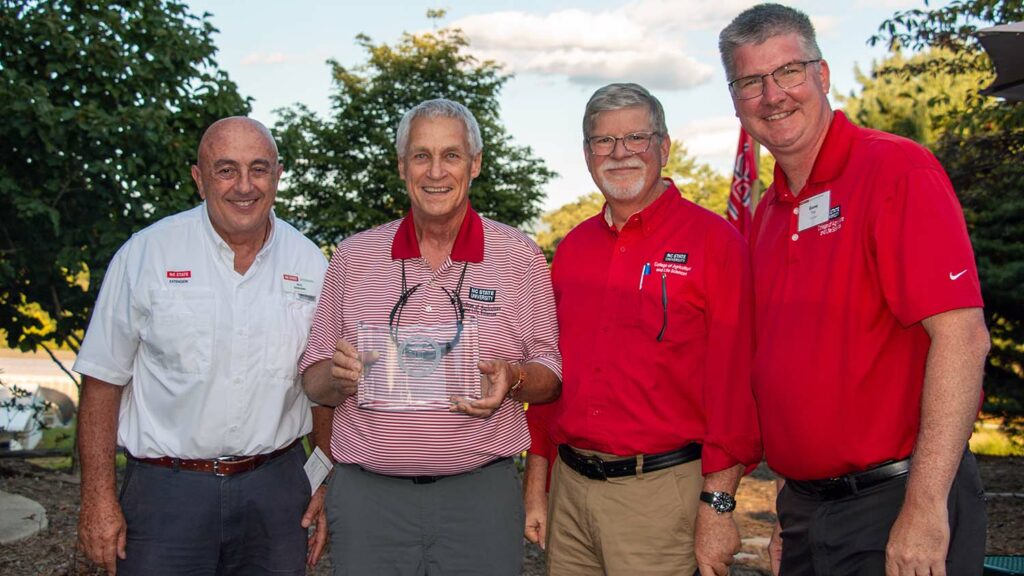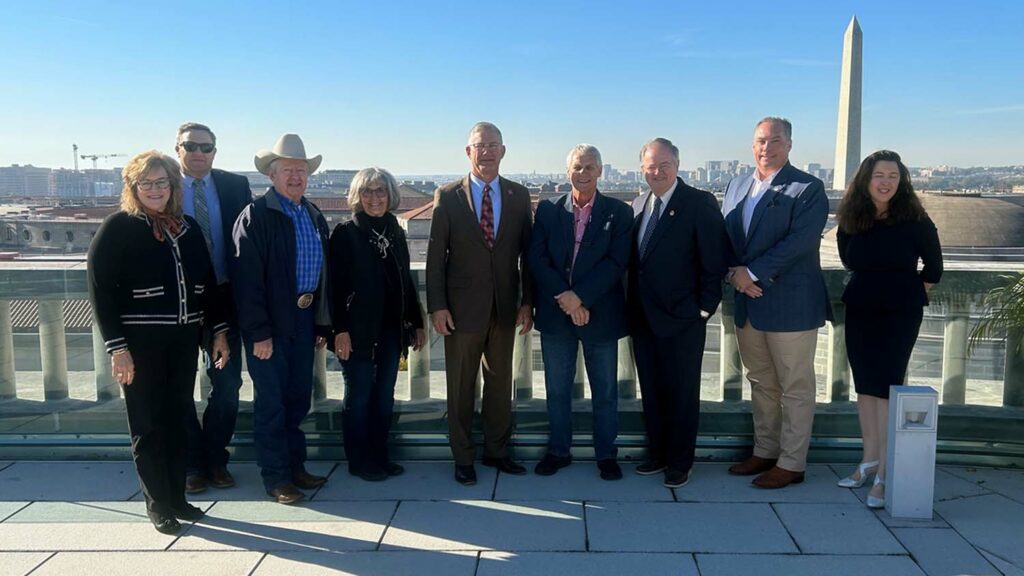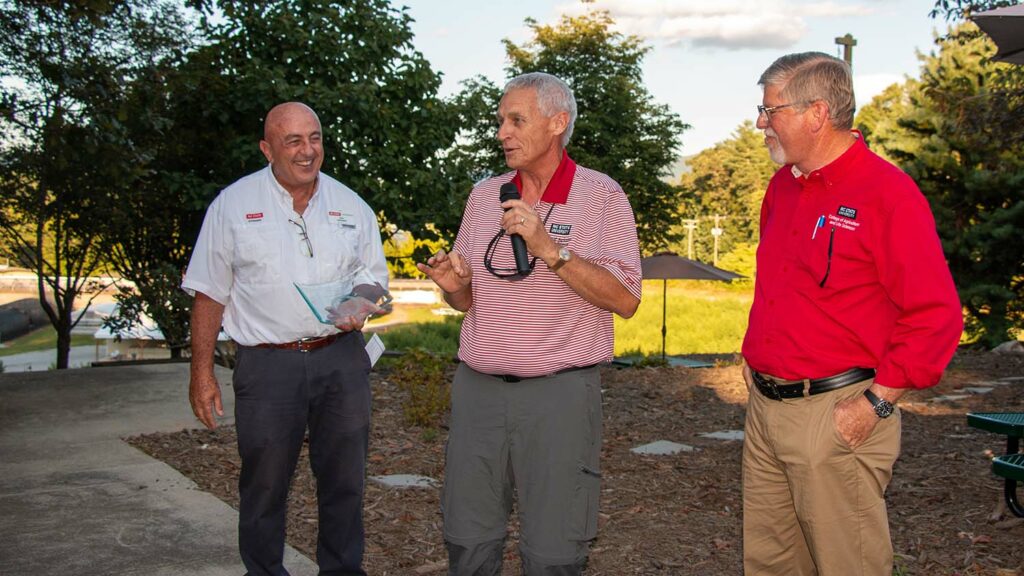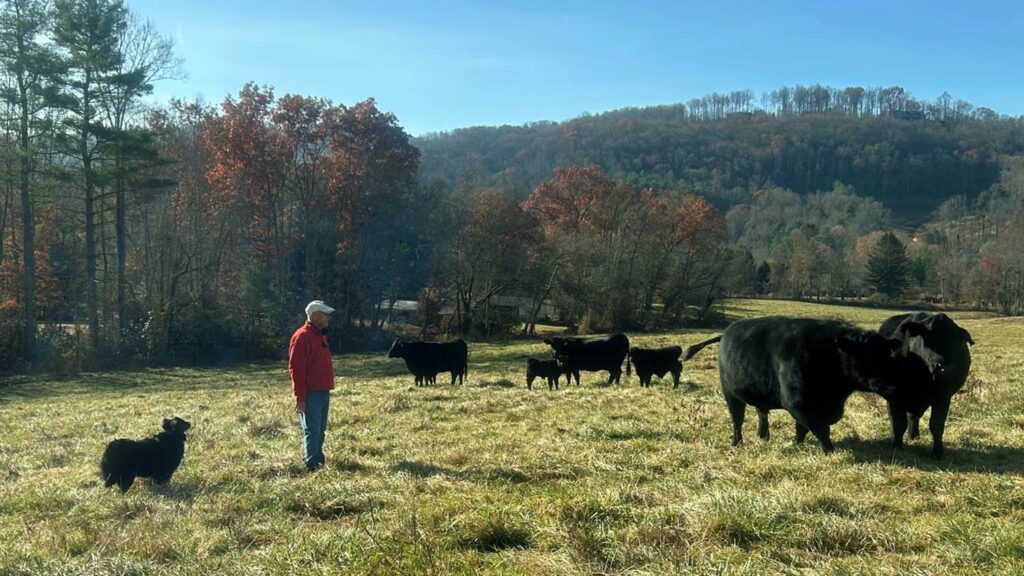Celebrating an Advocate for NC State Extension and CALS Research
go.ncsu.edu/readext?969062
en Español / em Português
El inglés es el idioma de control de esta página. En la medida en que haya algún conflicto entre la traducción al inglés y la traducción, el inglés prevalece.
Al hacer clic en el enlace de traducción se activa un servicio de traducción gratuito para convertir la página al español. Al igual que con cualquier traducción por Internet, la conversión no es sensible al contexto y puede que no traduzca el texto en su significado original. NC State Extension no garantiza la exactitud del texto traducido. Por favor, tenga en cuenta que algunas aplicaciones y/o servicios pueden no funcionar como se espera cuando se traducen.
Português
Inglês é o idioma de controle desta página. Na medida que haja algum conflito entre o texto original em Inglês e a tradução, o Inglês prevalece.
Ao clicar no link de tradução, um serviço gratuito de tradução será ativado para converter a página para o Português. Como em qualquer tradução pela internet, a conversão não é sensivel ao contexto e pode não ocorrer a tradução para o significado orginal. O serviço de Extensão da Carolina do Norte (NC State Extension) não garante a exatidão do texto traduzido. Por favor, observe que algumas funções ou serviços podem não funcionar como esperado após a tradução.
English
English is the controlling language of this page. To the extent there is any conflict between the English text and the translation, English controls.
Clicking on the translation link activates a free translation service to convert the page to Spanish. As with any Internet translation, the conversion is not context-sensitive and may not translate the text to its original meaning. NC State Extension does not guarantee the accuracy of the translated text. Please note that some applications and/or services may not function as expected when translated.
Collapse ▲Noland Ramsey is a gifted storyteller. When he tells you about working in the apple orchards of Western North Carolina or hauling hay on a farm as a teenager, you are there with him, learning the value of an honest day’s pay for an honest day’s work.
When he talks about his first time deworming steers in a tiny building with scarcely any room to move, you can sense the thrill of working in close proximity to the powerful animals. When he speaks of feeding his cattle in a couple of feet of snow when it’s 10-below zero, you can see your breath in front of your face and feel your feet slowly growing numb as the cold, wet stuff seeps into your boots.
It is a trait that has served him well as one of NC State University’s volunteer CARET representatives, a position he held for 15 years before stepping down this year.
CARET is the Council for Agricultural Research, Extension and Teaching, a national grassroots organization created by the Association of Public and Land-Grant Universities (APLU) to advocate for the understanding and support of the mission of schools such as NC State.
States can have multiple CARET reps. North Carolina traditionally has two, one from the east and one from the west. The representatives typically come from animal agriculture and field crops backgrounds.
An important component of the job is to lobby legislators for funds for land-grant universities. That’s where Ramsey comes in. As an educator for many years and as a beef cattle producer who has benefited from research and Extension at NC State, he is well equipped to make a compelling case for how support for the university helps both producers and consumers.
“We visit with members of our Congressional delegation every spring in Washington,” NC State Extension Director Rich Bonanno said. “You have conversations with either the member or the agriculture staff. It isn’t enough to have the two associate deans sitting there, or the university’s main legislative affairs lobbyist. You’ve got to have people that benefit, the people that are on the ground that can say, ‘I’m the producer. I’m the stakeholder. I benefit from all of this. The value that you put in funding those programs ends up right on my farm.’ Having those individual producers tell that story is the magic of the communication that you have with members of Congress.”
It helps that he is a natural storyteller. To paraphrase an old commercial, when Noland Ramsey talks, people listen.
“He’s compelling. He’s a friendly guy. He’s a North Carolinian. And he’s a multi-generational farmer,” said Steven Lommel, associate dean and director of agricultural research for NC State’s College of Agriculture and Life Sciences and a member of the team that makes an annual trek to Washington, D.C. “Any congressman, any staff person or legislator that pops up out of the west, he either knows or knows somebody who knows. I’m just some suit from Raleigh, an academic. They listen and they’re polite and they know about our budgets and they help us. But it’s much more personal when they’ve got somebody who they know and trust and lives up there.”

Noland Ramsey, NC State’s CARET representative for 15 years, receives an award for his service from NC State Extension Director Rich Bonanno, CALS Associate Dean Steven Lommel, and CALS Dean Garey Fox.
Ramsey’s first-hand knowledge of the vital role research and Extension play in helping the state’s producers makes his a voice that commands attention.
“It absolutely made a difference that I was a producer,” he said. “When I sat down with a congressman I’d say, listen, look at the quality of cattle in Western North Carolina now compared to when it was 25 years ago, or 30 when I first started. Back then there was very little deworming done. Fly control was trying to spray them on the run as they went by. They didn’t have ear tags. Vaccinations came along, BQA, beef quality assurance, came along. You don’t get there without research. And then Extension, that’s what makes the difference. That’s what the land-grants are about — helping people feed the world and clothe the world.”
Future trips to D.C. will be made without Ramsey. After serving for 15 years, including the past eight on the CARET executive committee, he is stepping down at the end of the year. His last official act will be attending the national APLU meeting in Seattle Nov. 12-14.
“I’m 71 years old and it’s time for younger legs and younger brains to take over,” he said. “I’ve enjoyed it. It’s been great work. It was always interesting and it was always a joy. It was a great experience. You did your thing and just hoped for the best.”

Noland Ramsey (fourth from right) made many trips to the nation’s capital to advocate on behalf of NC State’s land-grant mission.
His impact won’t soon be forgotten.
“He would have the ability to lay out his operation, and he had really good knowledge of agriculture in Western North Carolina,” Bonanno said. “He could not only just talk about his own operation, but he knew enough about how this entire part of the state really benefited from Extension and research. So he brought that knowledge and a great demeanor. He was a teacher, so he just had that ability to communicate.”
A Passion for People
Ramsey became interested in agriculture from a young age, working in the orchards around Edneyville in Henderson County, and hauling hay on a farm “where the Walmart is in Hendersonville now.”
“It was Oliver Orr’s farm, an old-timer that I went to church with,” he said. “We put up hay on a two-mule wagon with pitchforks, and then we’d go down and throw it in that big old hip-roof barn. I loved every minute of it. And then my grandfather had a farm down in Anson County. He had a little tobacco and a little cotton. “
His career path took him into the education field. He became a teacher, a principal and a school administrator. But he always kept beef cattle. His early, exhilarating experience with helping a friend deworm steers heightened his desire to become a rancher.
“He asked if I wanted to help me work the cattle,” Ramsey said. “We were in a little building that wasn’t but 10 by 10. We pinned them against the wall; we didn’t have a catch chute or anything. After that, I asked if I could put some calves in a pasture behind me in the development where we lived. Once I got started, I was hooked.”
As an educator, he knew the importance of knowledge. As a rookie rancher, he knew how to obtain it.
“The first place I went after I got cattle was the Extension center in Hendersonville,” he said. “I started learning about deworming, and working cattle, and feeding them, and how much feed it took for the winter, how much hay and how much grain. It definitely made a difference.”
His interest in and knowledge of local agriculture, his experience as an educator and leader, his status in the community, and his affable nature that led him to forge fast and firm friendships with just about everyone he met made Ramsey a natural choice to serve on Extension’s Henderson County Advisory Council.

Rich Bonanno and Steven Lommel listen as Noland Ramsey tells stories of his time as NC State’s CARET representative. Ramsey was recognized for his service during a field day at the Mountain Horticultural Crops Research and Extension Center in Mills River.
The same gifts led to a position on the State Advisory Council, which is led by the NC State Extension director and advocates with government and community leaders on behalf of producers and consumers and serves as a liaison between county advisory councils and state Extension administration.
When there was an opening for an NC State CARET representative, Ramsey was an easy choice.
“I’ve always had a passion for people,” he said. “I love people and I love education and I love people getting educated to make things better for themselves and others. That’s what Extension does, and that’s what the land-grants do, so it was an easy transition.”
Fighting for Famers
Ramsey soon learned that wrangling cattle can be a breeze compared to working with politicians.
“Washington is Washington,” he said with a good-natured smile. “It changes so much. It’s a different issue every year, but they always say, ‘with everything else going on right now we’ll do the best we can.’”
Naturally, the storyteller has a couple of good tales to tell about his trips to the nation’s capital.
“We had a congresswoman one time,” he said. “You’d go into her office and she would be standing there welcoming you and you’d think, ‘Well, this is great. This is going to be a great visit.’ And you walked in and her aides lined you up. She got in front, took a picture, and you went out the other door. And that was the extent of the visit. There was no conversation.”

Noland Ramsey with some of his cattle in Henderson County.
While trips to Washington and lobbying for funding for land-grant universities in the farm bill were the most visible role, there’s much more to the duties of a CARET representative. There were quarterly meetings of the executive council, and meetings with local and state legislators.
“Being a CARET rep, it is not just in Washington,” he said. “I know all of our elected officials, county, state.”
Perhaps most important to Ramsey were the unofficial duties — being a constant champion of NC State, Extension and North Carolina agriculture.
“I’ve always taken it a step further,” he said. “I go to every farm meeting I can get to. I used to teach advocacy for Extension when I was on the State Advisory Council and I’d tell folks, you don’t want to be a mile wide and an inch deep. When people see you in a meeting, you want them to know who you are and why you’re there. That’s important. I’d say, listen, you’re going to see those people at church. You’re going to see them in the grocery store. You’re going to see them at your kids’ ball games. You need to be ready to give them that 30-second elevator speech. We sure do need this money. We’ve got holes in the roof of the research station. We need that fixed.”
As much as he has enjoyed his time as a rancher and as a CARET representative, the time has come to scale back. But that doesn’t mean stopping completely.
He’ll still keep a few cows.
“I used to lease a lot of land and raise mostly for the wholesale market,” he said. “I had one lease for about 20 years and it was about 50 acres. The last one I had was up towards Etowah. When I lost that one, I told my wife, ‘Maybe I’ll just keep what I can do at the house for a while.’ She liked that because I wasn’t going out in the winter time and feeding hay in 2 feet of snow and 10-below.”
And he won’t stop getting the word out about the importance of the land-grant mission and NC State Extension.
“I’ll still be involved,” he said. “They’ll have to give me a free meal because I’ll show up at every field day, and every other farm meeting. I’ll never stop advocating for the land-grant mission and for NC State. And besides that, I just like being around these people because they’re really good people, they’re outstanding people. I like to be around farmers and producers and people who work with farmers and producers and make it better for them.”

